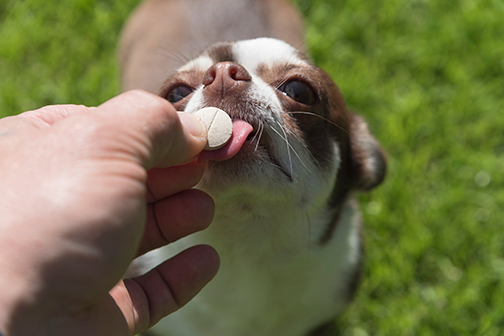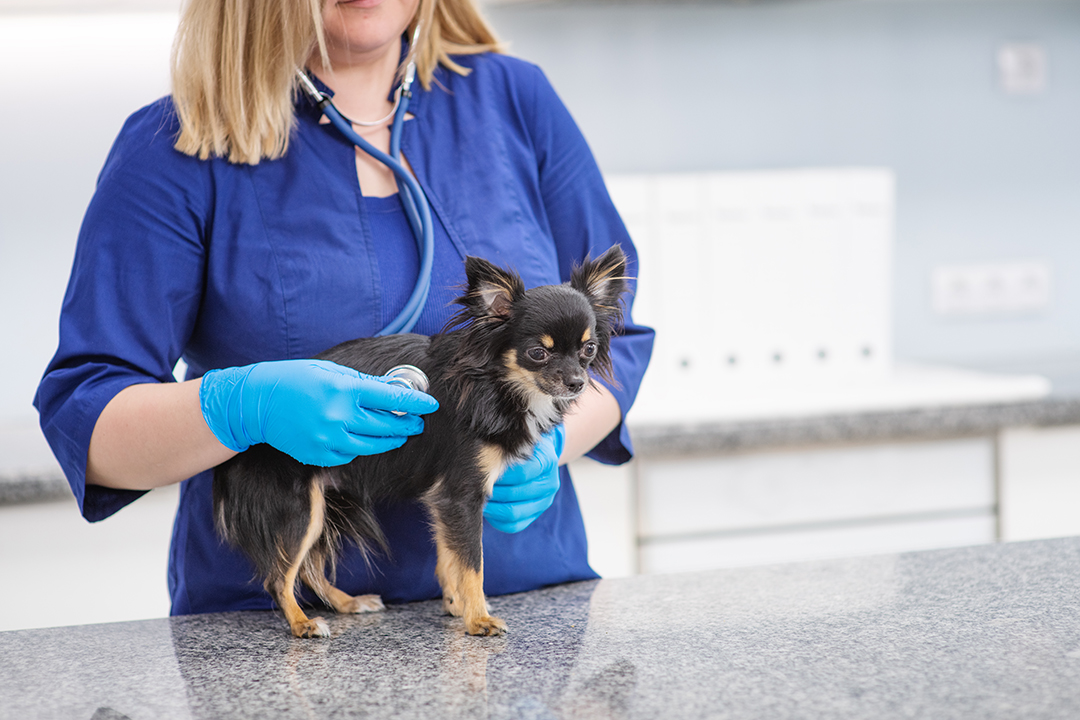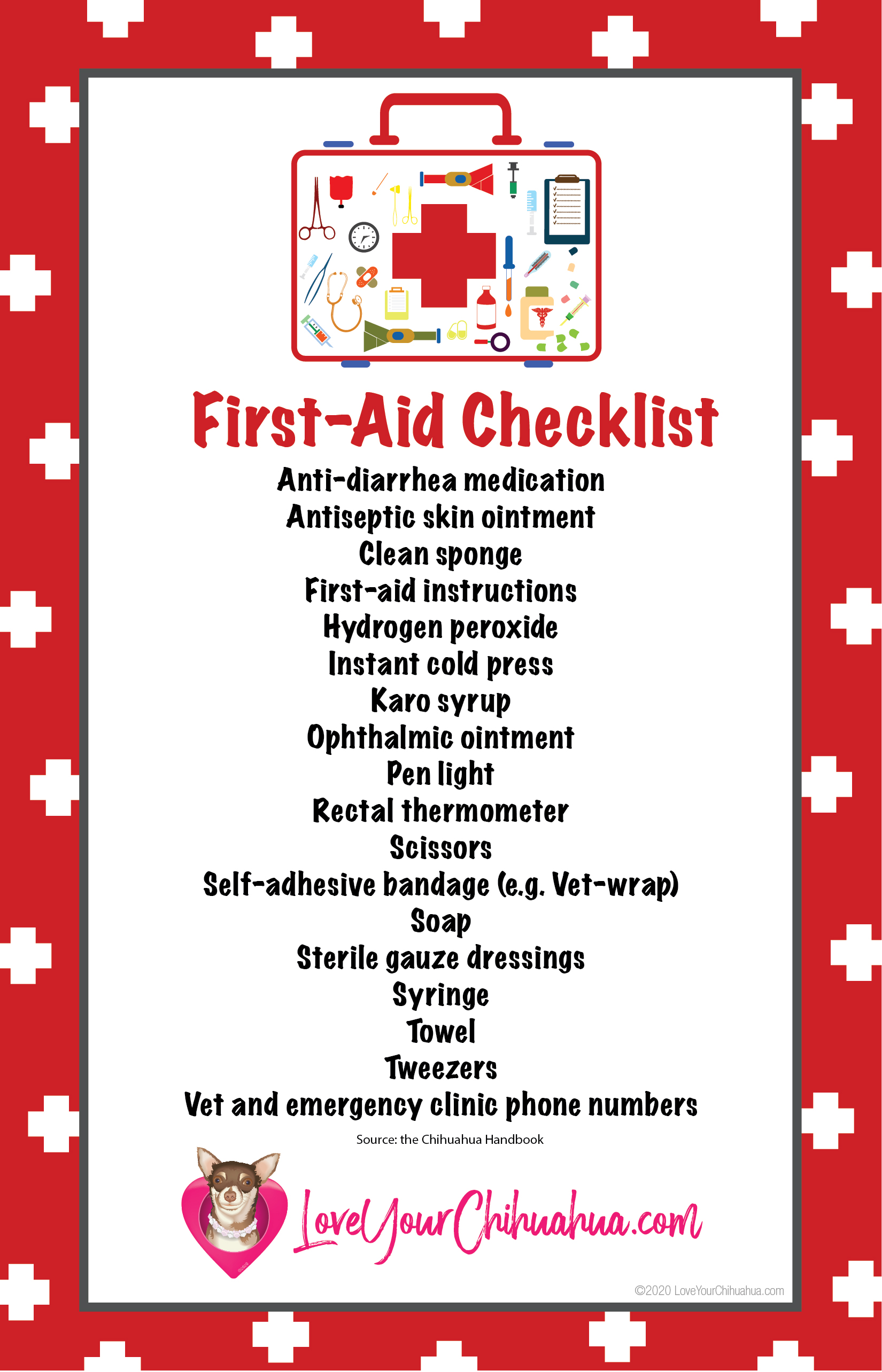Preventative Medicine for your Chihuahua
Ensuring a Healthy Life for Your Chi

Preventative medicine for your Chihuahua is so important to maintain her overall good health. Educate yourself on how to take good care of your Chihuahua, including how to identify issues, making time for a five minute weekly checkup at home with your Chi, and make sure you schedule daily exercise and quality time with your Chihuahua.
Choose your veterinarian wisely; a vet that understands the
needs and anatomy of a Chihuahua. Your Chi depends on you to ensure healthy
eating habits, scheduled well timed vaccinations and to protect her from
accidents, disease, parasites, and overall health monitoring. You and your veterinarian
should work as a team to ensure a lifetime of good health for your Chihuahua.

Blood Tests
Getting an annual blood test for your Chihuahua can provide valuable clues regarding their health. Most vets suggest doing running a panel during the annual exam and before any major surgery to ensure your Chi is healthy enough to undergo a surgery. The most common tests are the complete blood count (CBC) and the serum chemistry profile (chem panel). There are many other specialized tests used regularly. The complete blood count test consists of information about red blood cells, cells responsible for carrying oxygen throughout the body, white blood cells, are infection fighting cells and platelets are responsible for clotting blood to stop bleeding.
The chem panel mainly identifies kidney or liver abnormalities. The test includes: Albumin, low levels may suggest liver or kidney disease or parasites; Alanine, high levels suggest liver disease; Alkaline phosphatase, high levels suggest liver disease or Cushing’s syndrome; Amylase, high levels suggest pancreatic or kidney disease; Blood urea nitrogen, high levels suggest kidney disease; Calcium, high levels suggest kidney or parathyroid disease or possibly a tumor; Cholesterol, high levels suggest liver or kidney disease or several other disorders; Creatinine, high levels suggest kidney disease or urinary obstruction; Blood Glucose, low levels can suggest kidney disease; Phosphorous, high levels suggest kidney disease; Total bilirubin, abnormal level can indicate issues in the bile ducts; Total protein, abnormal level can indicate issues in the liver, kidney or gastrointestinal tract.
Parasites
Parasites are one of the most common skin and coat problems. Their damage goes below the skin and many parasites also carry serious and even deadly systemic diseases. The pricey monthly applications products are worth the price than the daily application of cheaper versions. Most start killing fleas and other parasites right away. Compare and check the ingredients and you will see that the less expensive products are actually not a deal at all. Imidacloprid (Advantage), Spinosad (Comfortis), Dinototefuran (Vectra) and Selamectin (Revoultion) have slightly different features, but they all start to kill fleas immediately and require monthly application to be effective.
Check with your vet on the best solution for your Chihuahua. I use Revolution which kills fleas, ear mites, ticks, several internal parasites and is a heart-worm preventative. Don't forget to protect your Chihuahua against deadly heart-worm parasites carried by mosquitoes. Again monthly protection is the most popular and suggested form, as it has a larger margin of safety and protection. The type of climate you live will determine if your Chi needs year around protection of just during the summer months. Speak to your veterinarian for details.
The best way to prevent tapeworms is to effectively prevent fleas, as they transmit the most common tapeworm. For ticks, you can use a tick collar and also manually search with your hands and carefully remove them as close to the skin as possible with tweezers ensuring the head is pulled out and clean with alcohol. Ear mites will look like coffee grinds in your pup’s ear, let your veterinarian know and they will provide the best medication for your Chi.
Ehrlichiosis is something else to watch out for in your Chi, as it is a potentially fatal disease and is underdiagnosed. It is spread by ticks and affects white blood cells and cripples the immune system. You may see these symptoms in your Chihuahua initially: lack of energy, dullness of coat, occasional vomiting and loss of appetite, coughing, arthritis, muscle wasting, seizures, spontaneous bleeding, anemia, and many other signs.
Your Chi may exhibit a fever initially and then no other signs will appear. Identification includes a blood test along with testing for all strains of Ehrlichia. If caught early, your Chi can be effectively treated.

Quick Check ups:
One of the best things you can go for your pup is to spend about five minutes every week for a quick health check. You will get to know what is normal for your Chi and can easily identify abnormalities when you are checking on a regular basis. You Chihuahua will view this as quality time with you as an added benefit. It’s good idea to keep a log of your findings that can be shared with your vet.
1. Check the mouth for red, bleeding, swollen or very pale gums. Look for loose teeth, ulcers on the tongue or gums or bad breath
2. Check eyes for discharge, cloudiness, or discolored or red in the whites of eyes
3. Check ears for foul odor, redness, coffee ground looking spots (mites)discharge or crusted tips
4. Check nose for thickened or colored discharge
5. Check skin for parasites, hair loss, crusts, red spots, lumps, growths, swellings, sores, or pigmented lumps
6. Check feet and in between paws for cuts, abrasions, split nails, bumps, or misaligned toes
7. Check the anus region for redness, swelling or discharge
8. Look for mammary masses, changes in testicle size, discharge from the genital areas
In addition to these activities, also look for these changes in your Chihuahua:
a. Lack of movement, coordination, or limping, sore neck, loss of muscle, and any behavioral changes.
b. Observe your Chi for weight loss or weight gain
c. Note changes of increased urination, foul smelling or strangely colored urine, incontinence, swollen abdomen or black or bloody stools.
d. Also make a note of changes in appetite or water consumption, difficulty breathing, lethargy, coughing, gagging or loss of balance.
Identifying Signs of Sickness

Behavioral changes in your normally active Chihuahua are good identifiers that something is wrong. Your Chi may have slowed down for no reason or is exhibiting lethargic behavior, which is the most common sign of disease.
Some causes for this behavior can include infection, check your Chi for a fever; anemia, check gum color; circulatory issue, check gum color and pulse; pain, check limbs, neck, back for discomfort, check mouth, ears and eyes for pain, check your Chi’s stomach or if she is standing in a hunched position; sudden loss of vision; poisoning, check gum color, pupils and reactions which should be small in bright light, vomiting and stomach pain is also a sign of poisoning; cancer; metabolic disease; and hypoglycemia behavior may be circling, pacing, orientation, disorientation, off balance, hiding, tremors, seizures, lack of bowel or urine control or major changes in appetite are usually signs of a physical problem. If you Chihuahua is experiencing any of the issues, see your vet right away.
Safety and First Aid Checklist

One of the best things you can do for your Chihuahua is to create a first aid kit, including emergency instruction cards. Prepare for emergencies right away before something happens. Keep a CPR instruction card in your emergency kit. Karo corn syrup will help if your Chi is experiencing symptoms of hypoglycemia including drowsiness and lack of coordination.
Familiarize yourself on what to do if your Chihuahua is having a seizure, has heatstroke, hypoglycemia, a bleeding wound, a fracture, an insect sting or an allergic reaction. I have added basic items in the chart above for your reference.
Chihuahua Health Challenges
No breed is perfect, although Chihuahuas come pretty close! Like other breeds, Chihuahuas have health concerns specific to their breed. In comparison to other breeds though, Chihuahuas have a lot less health conditions to worry about, some of which are hereditary.
Most Chihuahuas live long healthy lives without encountering any serious hereditary problems. The most common hereditary issues in Chihuahuas are patellar luxation, hydrocephalus, tracheal collapse and in tiny or young Chihuahuas hypoglycemia. Patellar luxation is when their knee slips out of place.
You will notice, as you Chi will hold their leg up or hop every few steps. The knee may pop back in place depending on how severe it is, otherwise, surgery will be needed. It can be a painful condition if severe.
You can validate if your puppy has been cleared and certified either through a vet or through The Orthopedic Foundation for Animals (OFA). Hydrocephalus happens when fluids build in the brain. The skull cannot expand, so the pressure interferes with normal blood circulation and the brain can be damaged. This condition occurs mostly in small breeds. The genetic piece is not entirely clear.
The best advice is to not breed Chihuahuas with this condition. Tracheal collapse can occur in some, middle aged Chihuahuas. This can happen when the cartilage that is part of the rings of the trachea become weak. In turn, a Chihuahua’s airway becomes obstructed and causes reflexive coughing which will worsen over time. Again, the hereditary component is not clear.
Hypoglycemia occurs when blood sugar levels are dangerously low and mainly affects puppies that are experiencing stress or when their feeding time is delayed. This condition is not hereditary and is caused by an immature liver and a small body. Symptoms include sleepiness, weakness, and loss of appetite and coordination.
Tiny and young Chihuahuas are at the highest risk. If you notice this behavior in your puppy, veterinarians recommend to rub Karo syrup or honey on the gums and the roof of the mouth (not down their throat where they could choke) and keep your Chi warm and the condition should improve within a few minutes. The best way to avoid this is to make sure your puppy is happy and comfortable and feed them on a regular schedule that is in line with their age and recommendations from your vet and/or breeder.
Chihuahua Dog Care
Quick Links for the main topics you will find on Love Your Chihuahua









